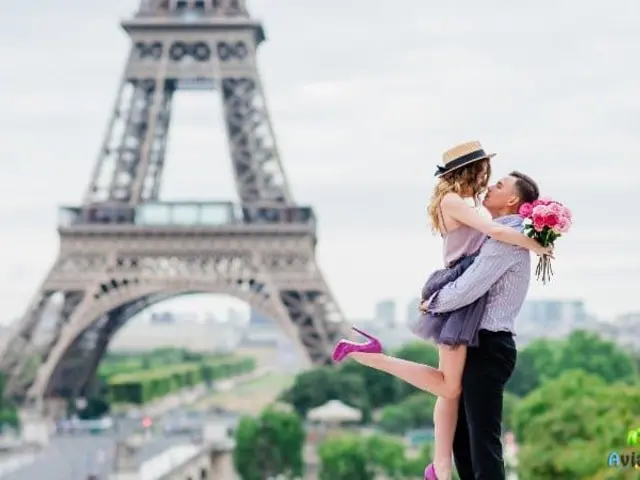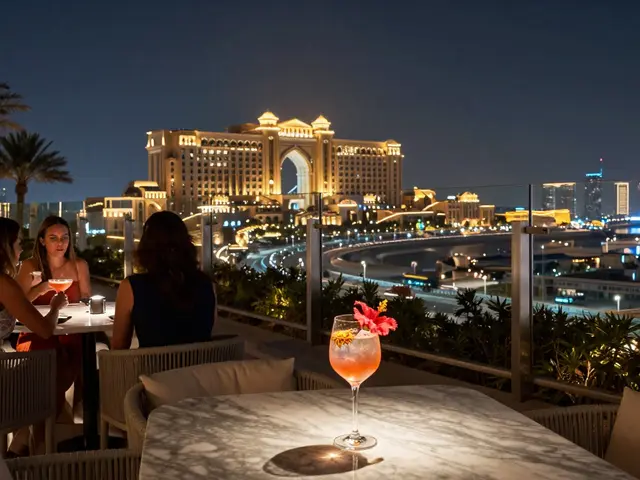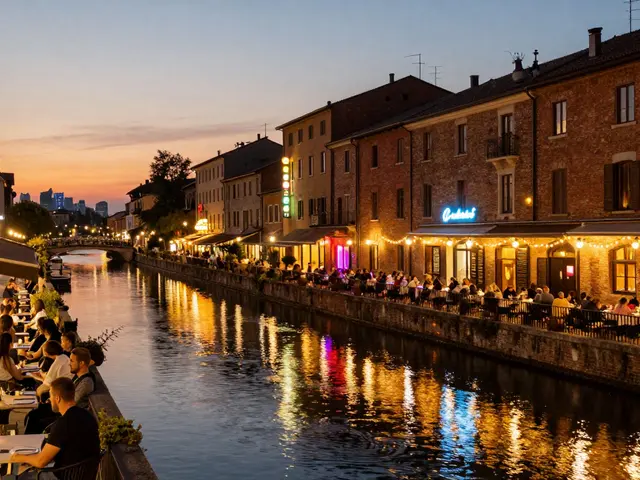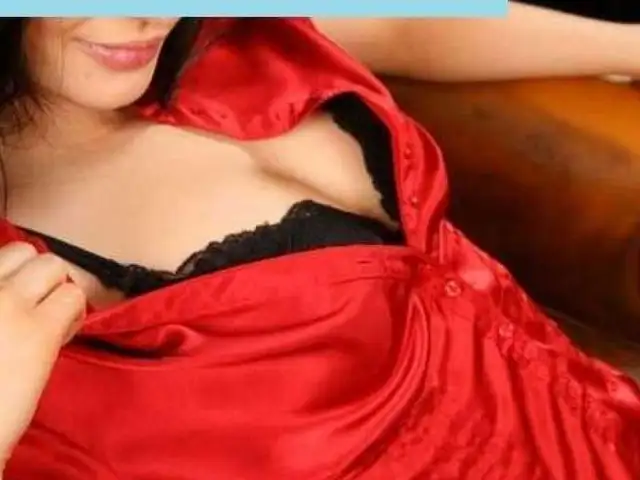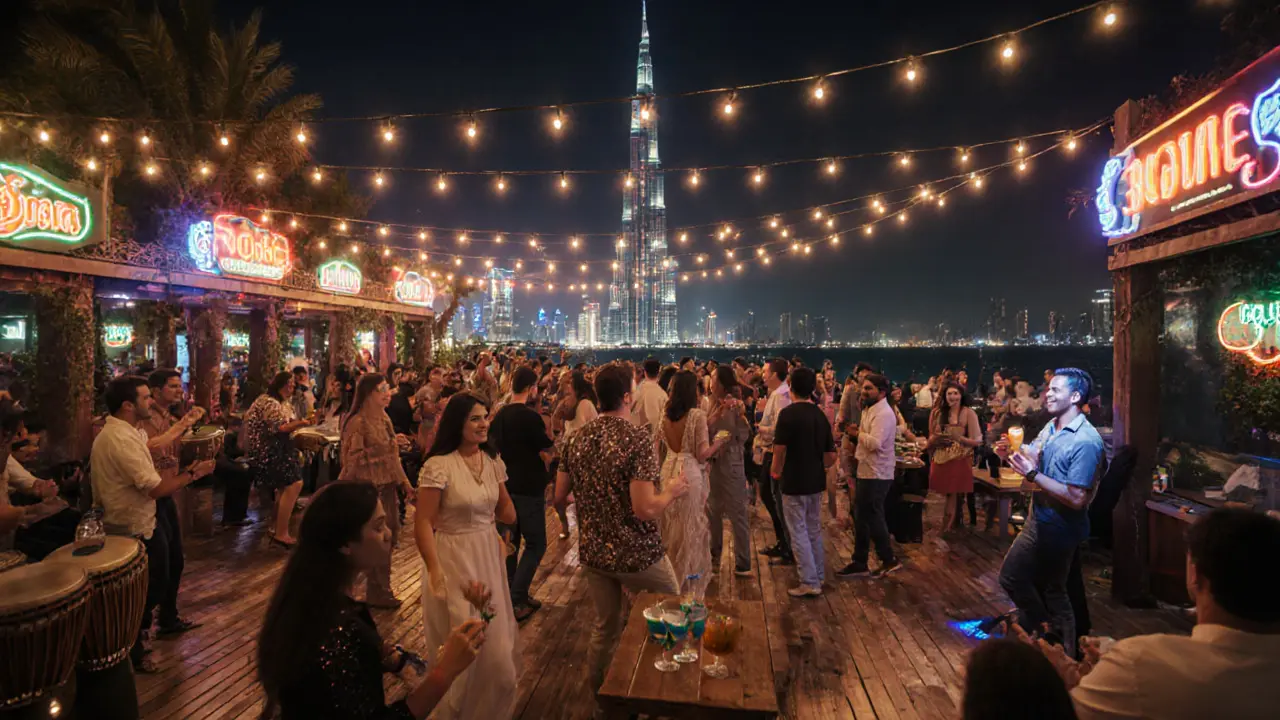
Dubai doesn’t sleep. While the sun sets behind the Burj Khalifa, the city wakes up in a different way - louder, brighter, and full of rhythm from every corner of the world. This isn’t just a city with bars and clubs. It’s a living mix of cultures, sounds, and stories that come alive after dark.
Where the World Comes to Party
Dubai’s nightlife isn’t built for one kind of crowd. Walk into a lounge in Downtown, and you’ll hear K-pop beats mixed with Arabic oud. Step into a beach club in JBR, and you’ll find Russians dancing to house music next to Indians sipping mocktails and Americans talking about the day’s desert safari. There’s no single soundtrack here - just a blend of global rhythms that somehow work together.
It’s not just about the music. It’s the people. You’ll see Emirati families enjoying shisha under fairy lights at Alserkal Avenue, Filipino DJs spinning at rooftop venues in Business Bay, and Brazilian dancers performing at private parties in Palm Jumeirah. Dubai doesn’t force a uniform vibe. It lets each culture bring its own flavor - and the city amplifies it.
The Club Scene: More Than Just Neon Lights
Forget what you think you know about Middle Eastern nightlife. Dubai’s clubs aren’t hidden or underground. They’re bold, luxurious, and designed for experience. Places like White Dubai and Cove Beach don’t just serve drinks - they create moments. Think private cabanas with ocean views, live percussionists playing traditional darbuka alongside electronic beats, and bartenders who know how to mix a saffron-infused gin tonic as well as a classic mojito.
Most clubs here open around 10 PM and stay busy until 2 or 3 AM. Some, like Armani/Prive, don’t even start ramping up until midnight. The dress code? Polished but not stiff. No flip-flops, no tank tops - but you won’t see suits either. It’s smart casual with a hint of glamour. And yes, you’ll need to book ahead. Walk-ins are rare after Friday night.
What’s surprising? Many of these clubs are owned by people who grew up in Lagos, Mumbai, or London. The owners don’t just want to make money - they want to recreate the energy of the places they love. That’s why you’ll find a Moroccan-inspired lounge in the same building as a Japanese whiskey bar with live taiko drumming.
Bars That Tell Stories
If clubs feel too loud, Dubai’s bars offer quieter, deeper experiences. At Al Funoon in Al Quoz, you’ll sip Arabic coffee brewed with cardamom while listening to oud music played by a local musician who’s been performing since he was 14. At The Library at The Address Downtown, you’ll find shelves of rare books, dim lighting, and a cocktail menu inspired by Emirati poetry.
There’s also the rise of speakeasies - places you have to know about to find. One hidden bar behind a refrigerator door in Alserkal Avenue serves drinks named after old Dubai neighborhoods. Another, tucked under a carpet shop in Deira, lets you order a drink by tapping a rhythm on a brass plate. The bartender knows what you mean before you speak.
These aren’t gimmicks. They’re nods to tradition. Dubai’s bartenders aren’t just mixing drinks - they’re preserving stories. A glass of date syrup whiskey isn’t just a cocktail. It’s a taste of the UAE’s past, reimagined for today’s crowd.
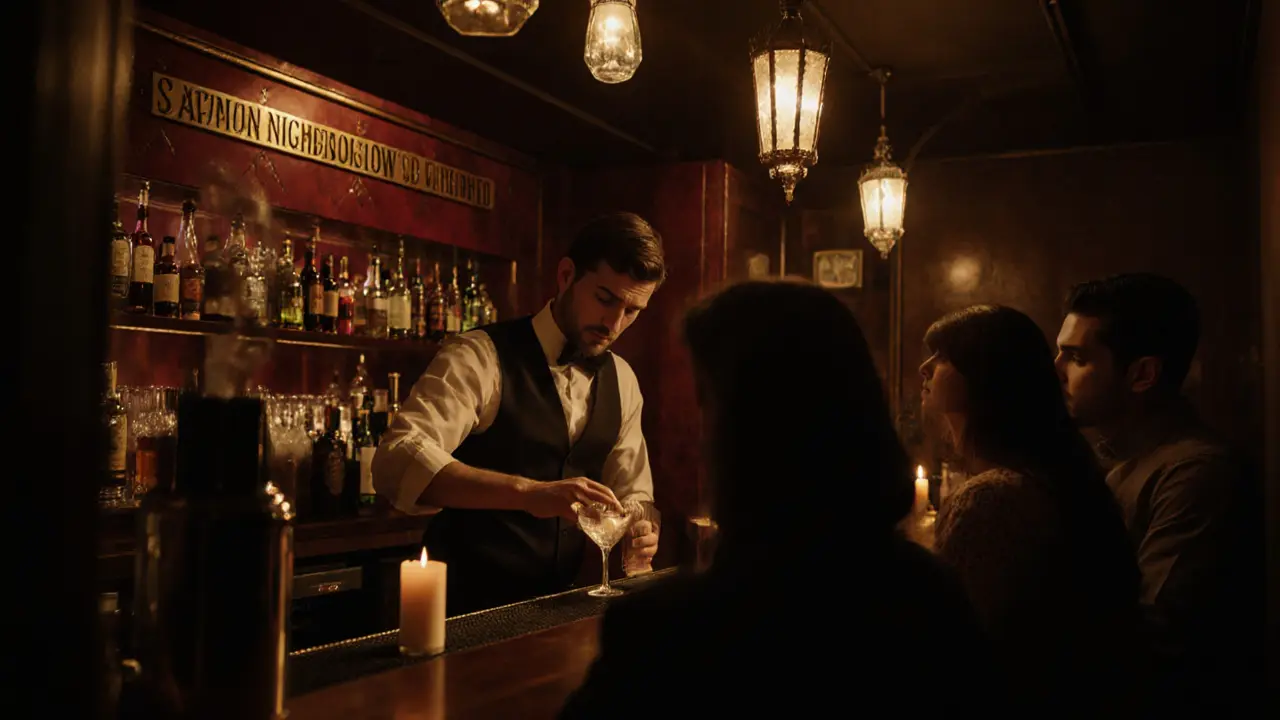
Music That Moves the City
Dubai’s music scene is a mosaic. On any given weekend, you can catch:
- A live Arabic jazz band at the Dubai Opera’s evening lounge
- A Korean indie band playing in a converted warehouse in Jebel Ali
- A Nigerian Afrobeat DJ spinning at a beach party in Mina Seyahi
- A classical Indian sitar performance under the stars at the Dubai Frame
There’s no genre that doesn’t have a home here. EDM festivals like AYNT and Electric Garden draw crowds of 20,000. But so do intimate jazz nights at The Jazz Café, where the crowd is mostly locals in their 40s and 50s who’ve been coming for a decade.
The government supports this. The Dubai Culture Authority funds music residencies for international artists. Local talent gets stage time at events like Dubai Music Week. And because of visa rules, musicians from over 70 countries can work here legally - something you won’t find in most cities.
What Makes It Different? No Taboos, Just Boundaries
Dubai doesn’t have the same nightlife rules as New York or Berlin. There are no 24-hour bars. Alcohol is served only in licensed venues - hotels, clubs, and private members’ lounges. Public drinking? Illegal. Public intoxication? Heavily fined.
But here’s the twist: within those boundaries, freedom thrives. You won’t see rowdy behavior. You won’t see fights. People respect the rules - and the culture. The result? A nightlife that’s safe, clean, and surprisingly elegant.
Even the security is part of the experience. Bouncers don’t just check IDs. They greet you by name if you’re a regular. They’ll tell you which table has the best view. They know who likes their drink with extra ice and who prefers it neat.
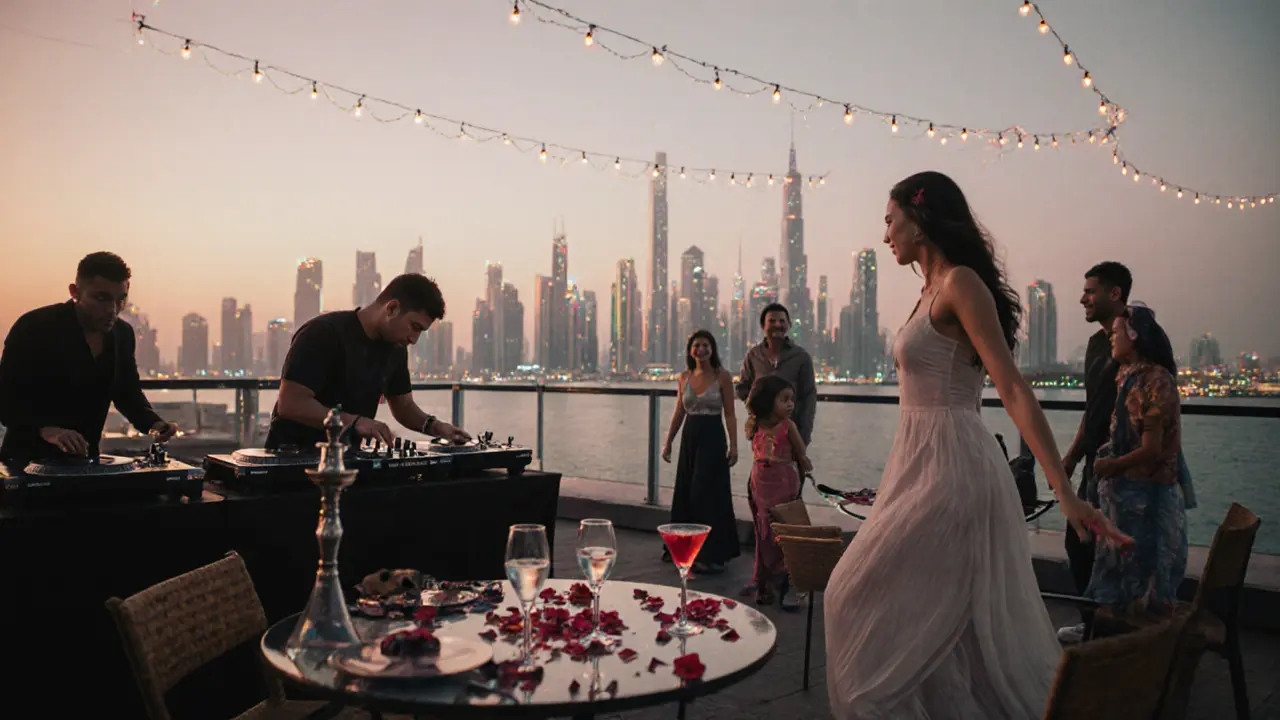
It’s Not Just for Tourists
A lot of people think Dubai’s nightlife is just for visitors. That’s not true. Locals - Emiratis, expats, long-term residents - live for it. Many Emirati families host evening gatherings at home, complete with traditional food and live music. Young professionals meet for rooftop dinners. Retirees from Europe and Australia gather for sunset wine tastings.
The city’s 200+ nationalities don’t just coexist - they create something new. A Lebanese chef opens a late-night mezze bar. A British producer drops a track blending Emirati folk samples with techno. A group of Filipino nurses start a weekly karaoke night that draws 100 people every Friday.
This isn’t a tourist attraction. It’s a lifestyle. And it’s growing. In 2024, Dubai added 17 new nightlife venues - more than any year since 2018. The number of international visitors coming specifically for nightlife rose by 22%.
What to Expect If You Go
Here’s the real deal if you’re planning a night out:
- Book ahead. Even casual spots fill up fast on weekends. Use apps like Bookatable or directly through venue websites.
- Know the rules. No public drinking. No holding hands too long. No offensive clothing. Follow the lead of locals - they know the unwritten codes.
- Try something new. Order a drink you’ve never heard of. Ask the bartender what’s popular tonight. You might get a rosewater lemonade with a hint of saffron.
- Go early. Most places get busy after 11 PM. Arrive at 9:30 to get the best seat.
- Leave your judgment at the door. You’ll see things you didn’t expect. That’s the point.
Dubai’s nightlife doesn’t try to be everything to everyone. It lets everyone be themselves - and then brings them together.
Is Dubai nightlife safe for solo travelers?
Yes, extremely. Dubai has one of the lowest crime rates in the world. Nightlife areas are well-lit, heavily monitored, and patrolled by security staff. Solo travelers - men and women - move around freely. Just stick to licensed venues and avoid public areas after midnight. Most clubs have female-only sections and dedicated transport options.
Can I drink alcohol in Dubai nightclubs?
Yes, but only in licensed venues. These include hotels, clubs, and private lounges. You must be 21 or older. Outside these places, drinking is illegal. Alcohol is expensive - expect to pay $15-$25 for a cocktail. Many places offer drink packages for groups, which can save money.
What’s the best night to go out in Dubai?
Friday and Saturday are the busiest. Friday nights start later (after 11 PM) and go until 3 AM. Saturday is the peak - most international DJs perform then. If you want a quieter vibe, try Thursday or Sunday. Some venues have themed nights - like Latin night on Tuesdays or retro disco on Wednesdays.
Are there family-friendly nightlife options in Dubai?
Absolutely. Many venues host family-friendly evenings before 10 PM. Places like The Walk at JBR have outdoor cinemas, live music, and food stalls. Alserkal Avenue hosts art walks and open-air performances. Some hotels offer evening buffets with live entertainment - perfect for couples or groups with kids. Just check the event times - most adult-only events start after 10 PM.
Do I need to dress a certain way?
Yes, but it’s simple. No beachwear, no flip-flops, no tank tops for men. Women can wear dresses, skirts, or jeans - no need to cover up unless you’re visiting a mosque nearby. Most venues expect smart casual: collared shirts, nice pants, heels or clean sneakers. When in doubt, dress like you’re going to a nice restaurant - not a club.
Dubai’s nightlife isn’t about flashing lights or loud music. It’s about connection - between cultures, between people, between tradition and innovation. It’s not perfect. But it’s real. And if you’re willing to step in with an open mind, you’ll leave with more than just memories. You’ll leave with a new way of seeing how the world can come together - one night at a time.

